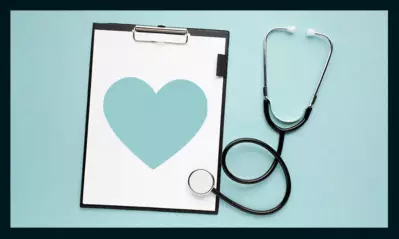Articles > Healthcare > What is community health?
What is community health?

Written by Michael Feder

This article was reviewed by Raelene Brooks, Dean, College of Nursing.

As the COVID-19 pandemic proved, public health plays a major role in daily life — even if we’re not always directly aware of it. Public health, however, predates the pandemic by centuries, and it and its subcategories, which include community health, play an important role in society.
What is community health?
What is community health and how does it relate to public health? Public health seeks to promote wellness and protect the public — which may include the population of a community, city, state or country — from diseases and illnesses. Immunization policies, responses to pandemics and health education campaigns all fall within the public health realm.
Research, planning, statistical modeling and legislation are all aspects of public health, but there are also hands-on roles that involve working directly with people. One of the biggest needs in this field is among underserved populations that often lack access to healthcare resources. This is where community health programs come into play.
Community health is a subspecialty of public health that focuses on the nonclinical aspects of healthcare in a community. Public health is often concerned with big-picture issues, such as creating a pandemic response or finding ways to reduce the rate of infections.
Meanwhile, community health pursues healthcare and wellness improvements at the local level. In addition to trying to improve medical access, services and health education, especially in underserved populations, community health identifies and tries to address socioeconomic, cultural and demographic factors that affect healthcare and wellness.
Community health relies on face-to-face interactions with community members for information gathering, education, outreach and medical services. Often these interactions take place in a community health center.
What is a community health center?
What is community health like at a community health center? These centers provide essential medical services, education and outreach. According to the Kaiser Family Foundation, federally funded community health locations served nearly 26 million people in 2016. (This doesn’t count other health centers funded locally.) Of the people served, 70% were below the federal poverty level, meaning community health centers offer services to which many people would not otherwise have access.
In addition to providing quality healthcare services, important goals of community health centers include offering health education, wellness training and information.
What is community health like for healthcare workers?
In order for community health to improve, professionals must tackle problems head-on. These individuals are known as community health workers.
Community health workers are frontline professionals who seek to improve healthcare services for residents in a specific area or a target group. They may work with providers to improve services, access to healthcare and messaging about subjects like wellness and disease prevention.
Some roles focus on identifying issues that prevent access to medical care or pinpointing causes of specific diseases within a community.
Community health workers can find employment in a variety of urban and rural settings where access to traditional private or public healthcare facilities is limited.
In these situations, professionals interact with the community to provide healthcare and strategize how to improve access. In addition to working with community members, community health workers may also advise providers and policymakers on how to improve services and outcomes for community members.
What is community health leadership? To take a leadership position in community health, you may need a master’s degree in public health. Leadership roles include the following:
- Public health administrator
- Public health program manager
- Health education specialist
- Public health officer
- Community health program coordinator
Any workers who provide clinical services, such as a public health nurse, need a nursing or medical degree and license from the state in which they operate. Other positions typically require a college degree in a subject like public health, social work or a related field.
Why is community health important?
Community health is essential because it addresses the needs of groups that lack access to the healthcare system and suffer from increased instances of medical problems as a result.
These issues can arise due to gender, race, age, economic class, location and cultural factors. The role of community health workers is to understand these complex and interwoven factors to develop strategies that overcome barriers and improve outcomes.
Here are some ways that community health efforts improve access and outcomes for underserved populations:
- Promote preventive medicine and medical checkups to reduce the need for emergency services
- Increase access to immunizations and medications
- Help families understand their risk for certain diseases and offer solutions to mitigate those risks
- Educate the population about wellness steps, such as regular fitness and a healthy diet
- Work with providers to offer health screens and checkups that meet the population’s needs
Community health efforts can also bring about better outcomes because workers are embedded in the community and can get feedback to see if the programs are effective.
Examples of community health programs
So, what does community health look like in practice? Here are some examples of how community health programs can bring about positive change within a population.
- Healthy eating: Some urban areas, such as neighborhoods within southern Los Angeles, are food deserts — places where healthy food is hard to come by. A student-run program called South Los Angeles Corner-Store Conversions sought to get owners of local markets to showcase healthy snacks like fruits instead of chips and candy.
- Community education programs: These efforts seek to improve outcomes for patients by educating them on prevention and disease management. In the River Region of Alabama, for example, a community health group successfully decreased emergency room visits for people with diabetes by more than 50% by offering a program showing them how to set wellness goals and manage their condition at home.
- Healthcare access: Some demographic groups fall behind on childhood immunizations because of a lack of information and access. Health workers may use community-based interventions to increase vaccination rates. Efforts can include holding immunization clinics in convenient community locations or offering home visits from public health nurses to provide and document vaccinations.
- Mental health: Some community programs seek to address the mental health needs of specific communities. For example, the Yakima Valley Farm Workers Clinic in Washington offers mental health services for local agricultural laborers. The clinics, which are located near the target population, are open evenings and weekends and staffed with workers who can meet the needs of the primarily Spanish-speaking clientele.
The types of programs can vary depending on the needs of a community.
How to work in community health
Community health can be a demanding field in which to work, but it can also be rewarding. And it’s necessary. The U.S. Bureau of Labor Statistics (BLS) projects that employment of community health workers will grow by 13% from 2022 to 2032. That is faster than the average growth for all professions.
BLS Occupational Employment Projections, 2022-2032 is published by the U.S. Bureau of Labor Statistics. This data reflects BLS’ projections of national (not local) conditions. These data points are not specific to University of Phoenix students or graduates.
People interested in community health work can start on their career path by pursuing a degree. According to BLS, the minimum qualification for many public health, health education and community health jobs is a bachelor’s degree in a relevant field, though some outreach workers can start their careers with a high school diploma and on-the-job training.
Community health workers can also get experience by volunteering or finding internships, which can help them develop skills necessary for the face-to-face aspects of community health.
What is community health education like?
What is community health education to prepare for this field, and what does a degree program look like? University of Phoenix offers a Master of Public Health with a concentration in Community Health Leadership, an online MPH degree.
Contact University of Phoenix for more information.

ABOUT THE AUTHOR
A graduate of Johns Hopkins University and its Writing Seminars program and winner of the Stephen A. Dixon Literary Prize, Michael Feder brings an eye for detail and a passion for research to every article he writes. His academic and professional background includes experience in marketing, content development, script writing and SEO. Today, he works as a multimedia specialist at University of Phoenix where he covers a variety of topics ranging from healthcare to IT.
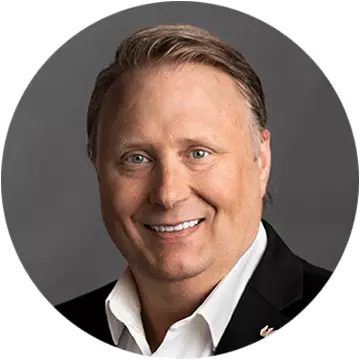
ABOUT THE REVIEWER
Mark Jóhannsson is the Dean of the College of Health Professions. He has a career spanning over 35 years of healthcare management, public health practice, higher education administration, teaching and clinical/behavioral research within corporate, community and academic settings. He has served as both an educational and keynote speaker, and he has been published in a variety of peer-reviewed and periodic literature.
This article has been vetted by University of Phoenix's editorial advisory committee.
Read more about our editorial process.
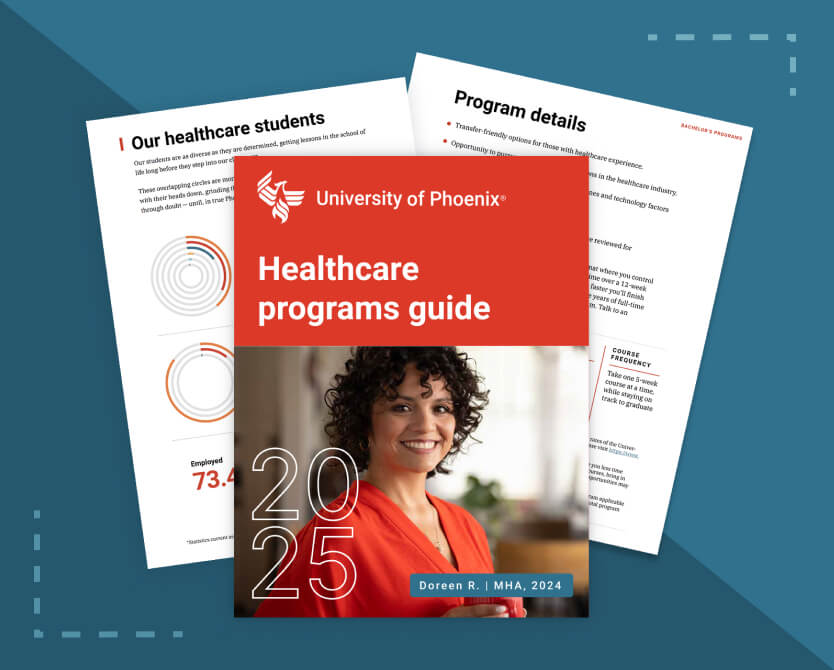

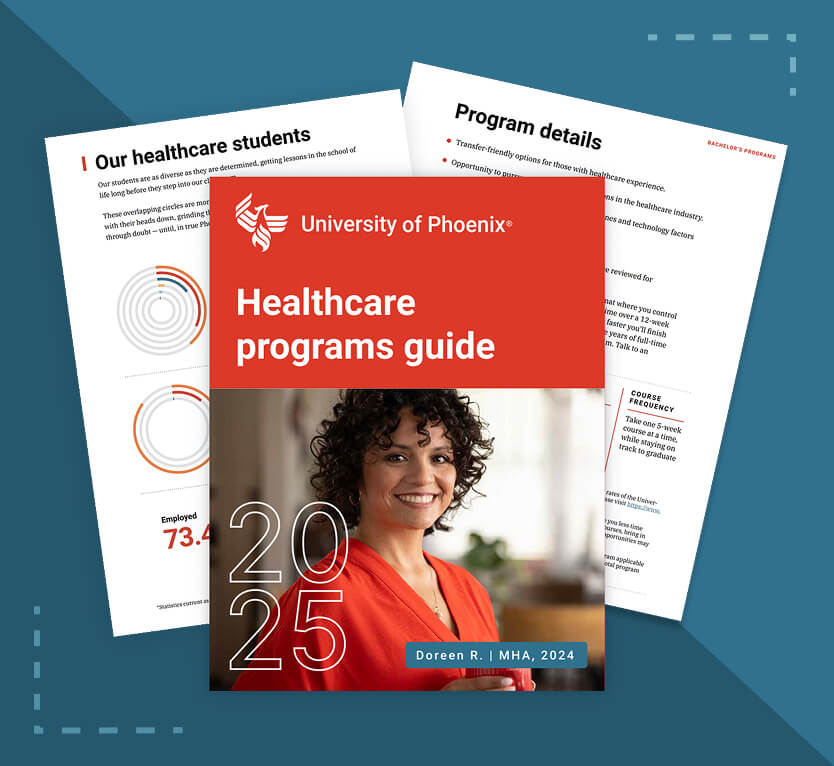
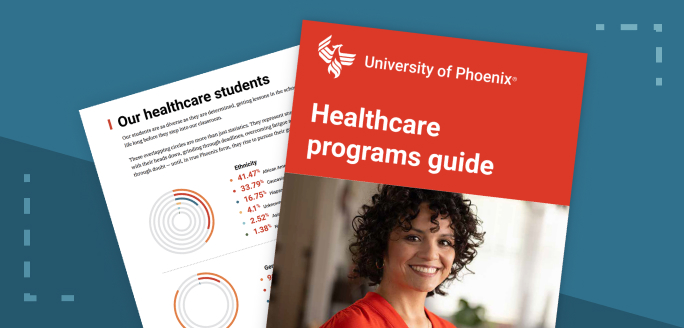
Get your free Healthcare programs guide
Explore our healthcare degrees and certificates - 100% of our programs are aligned to career-relevant skills.
You’re making moves!
This guide is loaded with answers. Download it now or get it from your inbox. Questions? We’re just a call or click away.
Get your free healthcare programs guide. Please enter your first and last name.
You’re making moves!
This guide is loaded with answers. Download it now or get it from your inbox. Questions? We’re just a call or click away.
